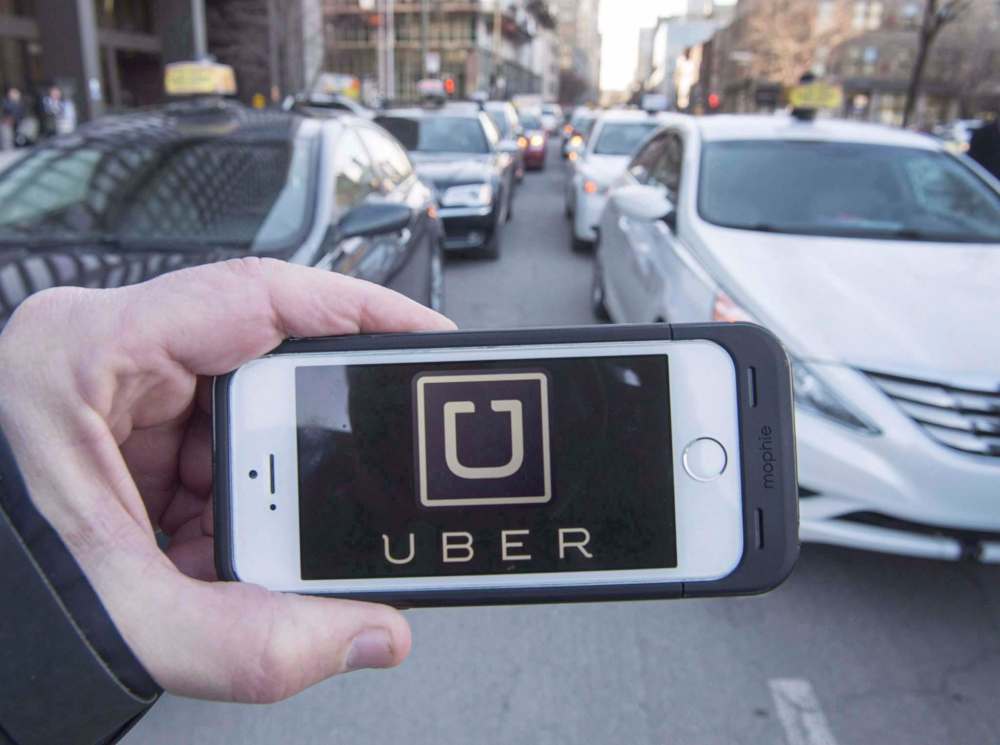Rideshare, taxi trips surge to record numbers Companies like Uber ride off with one third of the taxi industry’s market
Read this article for free:
or
Already have an account? Log in here »
To continue reading, please subscribe:
Monthly Digital Subscription
$0 for the first 4 weeks*
- Enjoy unlimited reading on winnipegfreepress.com
- Read the E-Edition, our digital replica newspaper
- Access News Break, our award-winning app
- Play interactive puzzles
*No charge for 4 weeks then price increases to the regular rate of $19.00 plus GST every four weeks. Offer available to new and qualified returning subscribers only. Cancel any time.
Monthly Digital Subscription
$4.75/week*
- Enjoy unlimited reading on winnipegfreepress.com
- Read the E-Edition, our digital replica newspaper
- Access News Break, our award-winning app
- Play interactive puzzles
*Billed as $19 plus GST every four weeks. Cancel any time.
To continue reading, please subscribe:
Add Free Press access to your Brandon Sun subscription for only an additional
$1 for the first 4 weeks*
*Your next subscription payment will increase by $1.00 and you will be charged $16.99 plus GST for four weeks. After four weeks, your payment will increase to $23.99 plus GST every four weeks.
Read unlimited articles for free today:
or
Already have an account? Log in here »
Hey there, time traveller!
This article was published 25/11/2022 (1110 days ago), so information in it may no longer be current.
People are sharing rides at record numbers in Winnipeg.
This year, the number of taxi and other rideshare trips in the city is poised to hit a new high of more than six million trips, according to Grant Heather, Winnipeg’s Vehicles for Hire manager.
“You’re starting to see people maybe shift away from using their own vehicles and…. that just comes down to having choices,” Heather said.
Choices, plus skyrocketing fuel prices causing people to abandon their cars, more events and an uptick in air travel after years of restrictions, he noted.
“I would estimate the trend (of ridesharing) will probably continue,” Heather said.
Winnipeg is on track to exceed six million vehicle for hire trips this year, according to Heather. By October’s end, 5.26 million of the rides had happened; the industry’s busiest two months hadn’t yet hit.
“The smaller (taxi) companies… at some point of time will come to a standstill.”–Kaustubh Patil, Spring Taxi’s manager
In 2019, there were 5.4 million trips. The past two years saw slower business — nearly 4.3 million trips in 2021, and 4.1 million in 2020 — due to the pandemic.
As ridesharing increases, the taxi industry’s dominance shrinks. Companies like Uber, a global brand, continue to gain traction.
“The smaller (taxi) companies… at some point of time will come to a standstill,” said Kaustubh Patil, Spring Taxi’s manager.
As of August, personal transportation providers — which includes Uber, limousines and other non-metred rideshares — accounted for one-third of vehicle for hire rides in Winnipeg, according to a recent City of Winnipeg report. Taxis made up the latter two-thirds.
Last year, taxis covered 77 per cent of trips; in 2020, they took on 90 per cent.
MIKE DEAL / WINNIPEG FREE PRESS Kaustubh Patil, manager of Spring Taxi and Blueline Transit, is having a hard time getting drivers with Uber in the market.
“(Uber is) certainly an impact,” Heather noted.
The company entered Winnipeg’s market in July of 2021. It’s in 140 cities and towns across Canada.
Patil isn’t yet worried about Uber snatching its customer base — there are folks who don’t use apps — but finding drivers is harder, because people can easily register their vehicles with Uber, he said.
“Nobody wants to drive taxis nowadays,” Brar said.
Spring Taxi is paying its drivers’ gas bills, diverging from others in the industry, to attract staff, Patil said.
“Nobody wants to drive taxis nowadays.”–Gagamdeep Brar, Unicity Taxi general manager
“We’re not afraid of the competition,” Gagandeep Brar, Unicity Taxi’s general manager, said of ridesharing services. “Anything that rideshare companies provide, we have it.”
Unicity Taxi launched an app showing estimated fares and times before Uber’s arrival. It has the city’s biggest taxi fleet, doesn’t surcharge and uses diamond lanes during rush hour. This makes Unicity more desirable, Brar said.
However, business hasn’t returned to 2019 levels, he noted.
“Right now, we are catching up,” he said, adding he hopes to return to a 2019-level customer base by the end of 2023.
There’s room for both taxis and other rideshare services in the market, said Heather.
Ryan Remiorz / The Canadian Press Files Ridesharing company Uber entered Winnipeg’s market in July of 2021 and is in 140 cities and towns across Canada.
“I think there’s enough opportunity in the way the bylaw is structured, the way we regulate the industry,” he said.
It’s up to companies to adapt, he added.
“The way service was provided 15 or 20 years ago… is different now,” Heather said. “People are looking for more at their fingertips.”
For Ralph Magsalin, Uber is convenient — the app hops borders, so he can use it as he travels.
“I like the fact that I can know the ratings that my driver has,” Magsalin said, waiting at Winnipeg’s airport Friday. “I’ve never had an issue with a taxi, but I just feel a little bit more secure.”
Stephanie Godard, also at the airport, chooses Uber — she finds it cheaper than taxis.
“I guess I’m more concerned about people getting paid properly,” said Sharon, a traveller who declined to give her last name.
“I like the fact that I can know the ratings that my driver has. I’ve never had an issue with a taxi, but I just feel a little bit more secure.”– Ralph Magsalin, Uber customer
Taxis are her go-to; she feels the workers receive fairer payment.
“Across Canada, ridesharing companies and taxis coexist, including in Winnipeg,” Keerthana Rang, Uber Canada’s corporate communications lead, wrote in an email. “By giving residents more transportation options outside of private car ownership, we see the overall market expand for all players.”
Winnipeg is home to local rideshare services like My Cab. Lyft, among other international giants, hasn’t arrived — if it did, it’d be a competitor to Uber. It likely wouldn’t take much of the taxi industry’s customers, Heather said.
As ridesharing increases, the city “has an opportunity” to better connect vehicles for hire and public transport, Heather added.
“(It’s) using kind of a first mile, last mile (approach),” he said.
He envisions suburbanites taking taxis and Ubers from their homes to major transit lines, then busing to work — it’d cut back on car culture.
Winnipeg issued 600 taxi licences this year, including 130 for accessible units. An average 1,065 personal transport providers, like Uber drivers, were available monthly in the first half of 2022.
By Aug. 31, personal transport provider rides surpassed 1.3 million. Such rides hadn’t hit one million annually since the city began tracking in 2018. Before last year, and Uber’s arrival, they hadn’t hit 400,000 annually.
Meantime, taxi rides have decreased. Last year, the industry saw 3.2 million rides, down from 2020’s 3.6 million and 2019’s 4.9 million. It had delivered 2.6 million rides by Aug. 31 of this year.
gabrielle.piche@winnipegfreepress.com

Gabby is a big fan of people, writing and learning. She graduated from Red River College’s Creative Communications program in the spring of 2020.
Our newsroom depends on a growing audience of readers to power our journalism. If you are not a paid reader, please consider becoming a subscriber.
Our newsroom depends on its audience of readers to power our journalism. Thank you for your support.
History
Updated on Sunday, November 27, 2022 9:41 AM CST: Updates spelling of Gagandeep Brar








